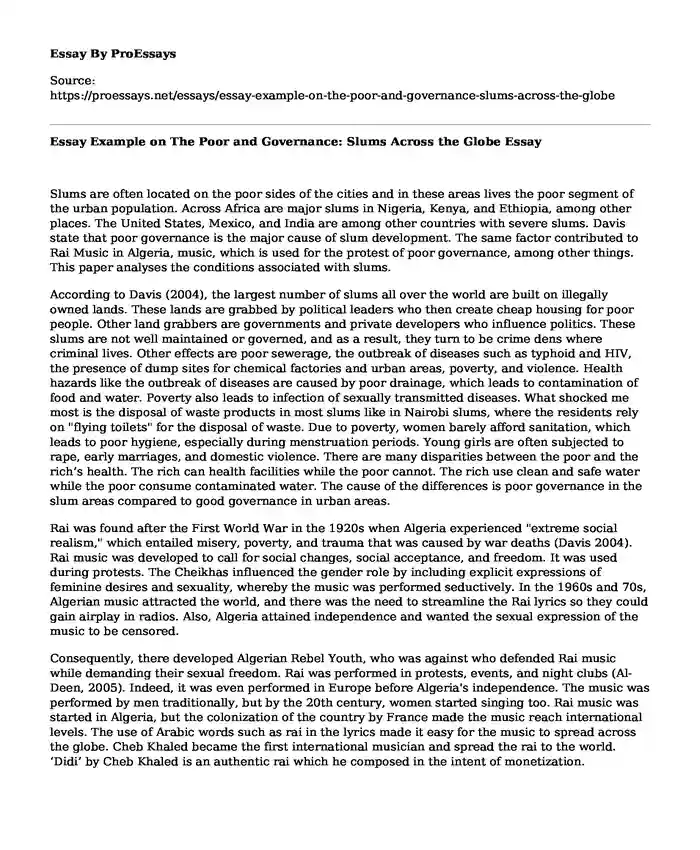Slums are often located on the poor sides of the cities and in these areas lives the poor segment of the urban population. Across Africa are major slums in Nigeria, Kenya, and Ethiopia, among other places. The United States, Mexico, and India are among other countries with severe slums. Davis state that poor governance is the major cause of slum development. The same factor contributed to Rai Music in Algeria, music, which is used for the protest of poor governance, among other things. This paper analyses the conditions associated with slums.
According to Davis (2004), the largest number of slums all over the world are built on illegally owned lands. These lands are grabbed by political leaders who then create cheap housing for poor people. Other land grabbers are governments and private developers who influence politics. These slums are not well maintained or governed, and as a result, they turn to be crime dens where criminal lives. Other effects are poor sewerage, the outbreak of diseases such as typhoid and HIV, the presence of dump sites for chemical factories and urban areas, poverty, and violence. Health hazards like the outbreak of diseases are caused by poor drainage, which leads to contamination of food and water. Poverty also leads to infection of sexually transmitted diseases. What shocked me most is the disposal of waste products in most slums like in Nairobi slums, where the residents rely on "flying toilets" for the disposal of waste. Due to poverty, women barely afford sanitation, which leads to poor hygiene, especially during menstruation periods. Young girls are often subjected to rape, early marriages, and domestic violence. There are many disparities between the poor and the rich’s health. The rich can health facilities while the poor cannot. The rich use clean and safe water while the poor consume contaminated water. The cause of the differences is poor governance in the slum areas compared to good governance in urban areas.
Rai was found after the First World War in the 1920s when Algeria experienced "extreme social realism," which entailed misery, poverty, and trauma that was caused by war deaths (Davis 2004). Rai music was developed to call for social changes, social acceptance, and freedom. It was used during protests. The Cheikhas influenced the gender role by including explicit expressions of feminine desires and sexuality, whereby the music was performed seductively. In the 1960s and 70s, Algerian music attracted the world, and there was the need to streamline the Rai lyrics so they could gain airplay in radios. Also, Algeria attained independence and wanted the sexual expression of the music to be censored.
Consequently, there developed Algerian Rebel Youth, who was against who defended Rai music while demanding their sexual freedom. Rai was performed in protests, events, and night clubs (Al-Deen, 2005). Indeed, it was even performed in Europe before Algeria's independence. The music was performed by men traditionally, but by the 20th century, women started singing too. Rai music was started in Algeria, but the colonization of the country by France made the music reach international levels. The use of Arabic words such as rai in the lyrics made it easy for the music to spread across the globe. Cheb Khaled became the first international musician and spread the rai to the world. ‘Didi’ by Cheb Khaled is an authentic rai which he composed in the intent of monetization.
Conclusion
In conclusion, poverty and poor governance are associated with slums and the development of rai music. Poor people suffer major injustices, whether living in developed or underdeveloped countries. For instance, the United States also has slums despite being one of the world’s most developed countries. The wide gap between the rich and the poor continues to widen even today, a problem that has been there for many years. Colonized countries like Algeria grew poor due to oppression by the colonizers. The Algerians used rai music to protest against human injustices such as poverty, freedom, and deaths.
References
Al-Deen, H. N. (2005). The evolution of rai music. Journal of Black Studies, 35(5), 597-611. https://doi.org/10.1177/0021934704273906
Davis, M. (2004, April 26). Planet of slums Mike Davis. California State University, Bakersfield. https://www.csub.edu/~mault/davis.htm
Cite this page
Essay Example on The Poor and Governance: Slums Across the Globe. (2023, Sep 10). Retrieved from https://proessays.net/essays/essay-example-on-the-poor-and-governance-slums-across-the-globe
If you are the original author of this essay and no longer wish to have it published on the ProEssays website, please click below to request its removal:
- Shaw Shank Redemption Ethical Dilemmas - Film Analysis Essay
- Research Paper on Georgian Theatre History
- Compare and Contrast Essay on Martin Luther and Frederick Douglas Thoughts
- Article Analysis Essay on A Drug That Wakes the Near Dead
- Essay Example on Countering Violent Religious Extremism: Obama Addresses Nation
- Essay Example on Decriminalization of Prostitution: The Dark Side
- The Power of Voice and Diction in Kingsolver's 'Poisonwood Bible' - Essay Sample







